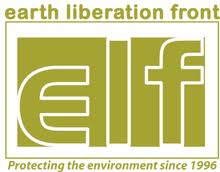Today, it seems as though every subnational or “radical” group of a country has the potential to be, or to become, a terrorist organization. This perceived threat induces questionable response by governments and the international community.
Founded in 1992, the Earth Liberation Front (ELF) is an environmentalist group that uses “economic sabotage and guerrilla warfare to stop the exploitation and destruction of the environment”. In 2001, the US Federal Bureau of Investigation classified the ELF as the top “domestic terror” threat because of its “eco-terrorist” activities. While it is true that this eco-defense group has employed unlawful ways of opposing environmentally harmful corporate practices in the past, as through vandalism and arson, the ELF has never killed anyone or conducted significant coercive attacks.
It is no coincidence that activists are branded “terrorists” at the same time that companies are blocked or prevented by these groups to pursue their financial interests. States and politicians have always used fear as an instrument for agenda setting and citizen submission. Whether it be fascism, communism or terrorism that the state is fighting, these ideologies are all useful in paralyzing whole populations with fear.
This can explain corporations’ and governments’ institutionalized view of activism and their growing normative response to conduct huge, top-priority anti-terrorism measures. It has even become normal for the FBI to criminalize political activism. Spreading fear among citizens and reinforcing anti-terrorist measures tampers with the objectives and effectiveness of social movements. Independent journalist Will Potter has stated that “[Terrorism] strips people of their personal identity.”

So what makes activism different from terrorism? Simply put, terrorism can be defined as the use, or threatened use, of premeditated violence against noncombatant targets by non-state or clandestine groups for political ends. Activism manifests itself in nongovernmental organizations, which are generally not-for-profit private organizations that focus on social, economic and political change in a country or region. In this sense, activist and terrorist groups both take shape as transnational networks (TANs), but they are far from equal in exerting the same degree of violence.
The comparison between activists’ acts of sabotage and terrorists’ suicide bombings and killings seems too big a leap to make. Yet, governments’ and corporations’ responses say otherwise. It becomes increasingly difficult to pinpoint an exact definition of terrorism. As a result, public opinion lacks clarity and guidance for deciding on the legitimacy of activist campaigns.
It is not the activist groups that break laws so much as the corporations that often covertly disregard environment protection and people’s livelihoods. Greenpeace has proved this by exposing multinationals’ lack of compliance with laws prohibiting whaling, pollution and deforestation. Therefore, isn’t the real issue actually regarding the impact activist groups can have on companies and jeopardize corporate profit, and therefore hinder their specific interests? How is it that certain types of activism and political protest are recognized by the international community, and others are not?
Amnesty International has coined the term “prisoners of conscience” to qualify individuals that have been imprisoned for peacefully expressing their beliefs. Why are these “prisoners” any different from other activist groups? Is the only reason that democratic governments sympathize with these “prisoners” because their non-violent approach to human rights and justice does not pose as much of a threat to the existing political system? How do states differentiate the right to self-determination from violent acts of terrorism? Even if non-profits are established organizations, they are not necessarily “safe” from being labeled terrorists.
Recently, the “War on Terror” has systemized and demonized activism to the extent that it is repetitively associated with radical, extremist behavior. Governments should not be allowed to infringe on the political ideas of social groups. In an ideal world, they would be held accountable to respect and enforce them. Expanding the concept and understanding of terrorism seems crucial for improvements in international criminal law.
Still, blurring the definitions of activism with terrorism has resulted in many casualties in the process. Since the Bush administration’s response to 9/11, states and international criminal courts have been influenced to carry out preemptive strikes against suspected terrorist groups and networks, ironically creating even more violence in the world.
All things considered, perhaps the problem is our categorization of “terrorism.” As Georgetown University Professor Bruce Hoffman wrote in an essay: “Terrorism is a pejorative term. It is a word with intrinsically negative connotations that is generally applied to one’s enemies and opponents, or to those with whom one disagrees and would otherwise prefer to ignore… Hence the decision to call someone or label some organization ‘terrorist’ becomes almost unavoidably subjective, depending largely on whether one sympathizes with or opposes the person/group/cause concerned.” This allows for criminalization of activists and causes anti-terrorist measures to be counterproductive.
Counter-terrorism has exacerbated the opposition between civil society and the nation-state, resulting in many more victims than necessary, domestically and across seas. Non-profits have become equally infamous for their actions as well as respected actors in global politics. Whatever their organizational methods or tactics, they have taken on a new role that frightens financial incentives and challenges conventional forms of governance. Rather than a divisive time, this should be a learning moment to promote cooperation between governments and transnational networks.
It would be sad to assume that governments are solely successful in persuading and mobilizing their citizens through the manipulation of their beliefs and fear-mongering. There is something to be said about incorporating an alternative outlook to sustainable living in our judgment of government responsibility, international institutions and citizen rights.




